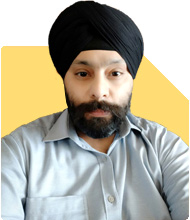Grandfather Seeking Financial Advice for Granddaughter's Future
Ramalingam Kalirajan |8093 Answers |Ask -Follow
Mutual Funds, Financial Planning Expert - Answered on Sep 10, 2024
He has an MBA in finance from the University of Madras and is a certified financial planner.
He is the director and chief financial planner at Holistic Investment, a Chennai-based firm that offers financial planning and wealth management advice.... more

Sir, I am 78 years old retired chemist. I and my Mrs. live with my only daughter looking after my granddaughter. Main aim in my life is to make secure future of my granddaughter financially.As I and my wife live with my son in law I have no expenses. Since they are doing extremely well in life financially they do not accept any financial help. So I want to invest in my granddaughter's name. My individual finances:: 1)15 lakhs in F.D.an average 8 percent rate of interest. 2) 20lakhs rs. in ppf 3)15 lakhs in PMVYYOJANAat 8./' intrest. 4)20 lakhs worth. InM.F.ason31/07/23 5) I earn ten thousand rupees by renting my house. 6)15000 rs PM by partime job. 7) I have ancestral property worth one and half corore.(Iam planning to take aloan of on my property under the scheme of reverse mortgage scheme for senior citizens by way of an over draft. I expect toget about one corore. For this amount iam planning to make a trust in the name of my family. Expect you to suggest me some guidelines.) 8) 100000rs inshres of Indian Bank, Karnataka Bank Bank of Maharashtra, Power grid corporation,yes bank 9) 50000 rupees in government gold bond maturity date 25/03/2025 10 )3lakhs in my S.B at any time for emergency.plus500000rs.insenior citizens scheme. 11)20 lakhs worth physical gold 12)50 lakhs worth of my wife 13)5 lakhs worth miscellaneous movable goods 14)5lakhs each of healthcare insurance for both husband and wife. My aim: 1) Make secure my granddaughter's future in my own way.Following is the way I plan to do it. 1) Investment of 150000per year since 2017 by her mother. 2) Investing of Rs.150000 per year from 2023 in PPFby me. 3) Lumpsum amount invested in her name in following MF a)UTI FLEXI CAP FUND 2o20 -1000units b)UTI focused equity fund 2021-1800 units c) Fixed deposit in UNITY SMALL BANK RS 150000 LAKHS. NEW INVESTMENT Plan to start SIP worth one lakh twenty thousand rupees that's ten thousand rupees per month as follows: 1) Multi asset fund 2500rs pm(Icici or Aditya Birla Sun Life or Hdfc ) 2) UTI flexicap fund 2500 rs PM I expect you to suggest four SIP FUNDS ----+-----++++++ I have given you all the details of my financial status. I plan to continue Investing in my PPFa/c at the rate of 150000rs As time is running out for me your suggestions will help me in better management of my finances. Waiting eagerly for your reply Yours sincerely V.G. Nadig Note : Do you want details of Mutual Fund companies. I have nearly 25 funds.
Here’s a 360-degree solution to help you better manage your finances and achieve your goals.
Your Existing Investments
Fixed Deposits (FDs): Rs. 15 lakhs earning an average of 8% interest is a stable investment. FDs are risk-free but offer lower returns over time when compared to other investment options. Inflation could erode the value of this amount in the long term.
Public Provident Fund (PPF): Rs. 20 lakhs in PPF is an excellent investment, offering tax-free interest. It also provides good security. It’s wise to continue investing Rs. 1.5 lakhs annually here as it will help create a substantial, risk-free corpus for the future.
Pradhan Mantri Vaya Vandana Yojana (PMVVY): Rs. 15 lakhs at an 8% interest rate in this scheme is a good choice for senior citizens like you. It provides regular income while being low-risk.
Mutual Funds: Rs. 20 lakhs in mutual funds is a good way to participate in market growth. These funds could offer higher returns over the long term, but they also carry more risk than FDs or PPF.
Physical Gold: Rs. 20 lakhs worth of gold is a solid hedge against inflation. However, gold alone won’t generate income or high returns. While it provides stability, too much gold can limit your portfolio’s growth potential.
Income Sources and Part-Time Job
You have Rs. 10,000 monthly rental income and Rs. 15,000 from your part-time job. This helps create a comfortable situation for your day-to-day needs. Since you live with your family and have no major expenses, it’s great that you can focus on investing for your granddaughter's future.
Reverse Mortgage Loan on Ancestral Property
Your plan to take a reverse mortgage loan is a good way to unlock the value of your ancestral property. You expect to get around Rs. 1 crore, and you are considering setting up a family trust. This is an excellent idea for securing your family’s financial future.
The reverse mortgage will provide you with funds while you continue to live in the house. You can use these funds to invest in your granddaughter’s name or create a long-term income stream.
Your Stock Portfolio
Shares: Rs. 1 lakh in stocks such as Indian Bank, Karnataka Bank, and Power Grid Corporation is a nice addition to your portfolio. However, individual stocks carry higher risk, especially if they are concentrated in one sector. Since you already have a decent exposure to mutual funds, you may consider reducing the risk in this area by reviewing the performance of these stocks periodically.
Gold Bonds and Senior Citizen Schemes
Gold Bonds: Rs. 50,000 in government gold bonds is another smart choice as it’s safer than holding physical gold. These bonds also offer some interest income and are free from the hassle of storage.
Senior Citizen Savings Scheme (SCSS): Rs. 5 lakhs in SCSS is an excellent low-risk option that provides a steady income. It’s advisable to continue holding this.
Health Insurance
Both you and your wife have Rs. 5 lakhs each in health insurance. This is a critical part of financial planning. At your age, medical expenses could be a significant burden. Having adequate health cover ensures that your savings won’t be affected by any unexpected medical costs.
Your Financial Goals for Granddaughter
You’re already doing a fantastic job with the investments you’ve made for your granddaughter. However, let’s look at how you can optimize this further.
PPF Contributions: You plan to invest Rs. 1.5 lakhs per year in her PPF account. This is an excellent idea. PPF is safe and offers tax benefits. Continue with this plan.
Mutual Fund Investments: You’ve already invested in funds like UTI Flexicap and UTI Focused Equity Fund. Both funds are actively managed and have the potential for growth over the long term. Actively managed funds tend to outperform index funds, as they adapt to market changes. Keep reviewing the performance of these funds every year with the help of a Certified Financial Planner (CFP).
New SIP Plan for Granddaughter
You have planned to start a Systematic Investment Plan (SIP) of Rs. 1.2 lakhs annually (Rs. 10,000 per month). This is a smart move, and it’s crucial to choose the right funds to build wealth for your granddaughter. I suggest focusing on the following types of funds:
Multi-Asset Fund: These funds invest in a mix of equity, debt, and gold. This diversification reduces risk while providing potential for growth. A multi-asset fund would be a great fit for your granddaughter’s long-term needs.
Flexi Cap Fund: This fund can invest across market capitalizations, offering both stability and growth potential. Since it’s actively managed, it will aim to maximize returns by adjusting to market conditions.
Aggressive Hybrid Fund: This fund balances equity and debt, providing both growth and safety. It’s ideal for wealth creation over the long term.
Trust and Estate Planning
You are planning to set up a family trust with the proceeds from the reverse mortgage. This is an excellent way to manage and protect your assets for the benefit of your family and your granddaughter. The trust will help ensure that the funds are used according to your wishes.
When setting up a trust, make sure to:
Define clear goals for the trust, such as education, marriage, or other specific needs for your granddaughter.
Appoint a reliable trustee, either a family member or a professional, to manage the trust.
Ensure that the trust is legally compliant and tax-efficient.
Considerations for Your Investment Portfolio
Risk Management: Since you are 78 years old, it’s essential to maintain a balanced portfolio. Too much exposure to equities could be risky. A mix of equity (mutual funds) and fixed income (PPF, FD, SCSS) would be ideal for reducing risk.
Review of Mutual Funds: With 25 mutual funds, there might be overlaps in your portfolio. A concentrated portfolio of a few well-performing funds is often better than spreading investments too thinly. It’s a good idea to consolidate your mutual funds into 4-5 top performers. Regularly reviewing them with a Certified Financial Planner will help optimize your returns.
Liquidity: You have Rs. 3 lakhs in your savings account for emergencies. This is a good strategy. Maintaining liquidity ensures that you can handle unforeseen expenses without disturbing long-term investments.
Tax Efficiency
Keep in mind the tax benefits available under sections like 80C for PPF and health insurance. Since you have multiple income sources (FD interest, rental income, part-time job), tax planning is crucial. Reducing your tax liability can help maximize your investments. A Certified Financial Planner can guide you on tax-saving strategies.
Final Insights
You are in a solid financial position, with diverse investments and a clear goal to secure your granddaughter’s future. Here are some key points to consider moving forward:
Continue your PPF contributions and mutual fund SIPs in her name.
Focus on multi-asset and flexi cap funds to balance growth and risk.
Review and consolidate your mutual funds to avoid overlaps.
Ensure your family trust is set up with clear goals and legal backing.
Regularly review your portfolio to ensure it aligns with your goals.
Your granddaughter’s future is already well on its way to being secure, thanks to your thoughtful planning and wise investments.
Best Regards,
K. Ramalingam, MBA, CFP,
Chief Financial Planner,
www.holisticinvestment.in
You may like to see similar questions and answers below
Ramalingam Kalirajan |8093 Answers |Ask -Follow
Mutual Funds, Financial Planning Expert - Answered on Jul 01, 2024
Ramalingam Kalirajan |8093 Answers |Ask -Follow
Mutual Funds, Financial Planning Expert - Answered on Oct 14, 2024
Ramalingam Kalirajan |8093 Answers |Ask -Follow
Mutual Funds, Financial Planning Expert - Answered on Feb 18, 2025
Nayagam P P |4324 Answers |Ask -Follow
Career Counsellor - Answered on Mar 12, 2025
Nayagam P P |4324 Answers |Ask -Follow
Career Counsellor - Answered on Mar 12, 2025
Inderpaul Singh |46 Answers |Ask -Follow
Leadership Coach - Answered on Mar 12, 2025
Inderpaul Singh |46 Answers |Ask -Follow
Leadership Coach - Answered on Mar 12, 2025
Nayagam P P |4324 Answers |Ask -Follow
Career Counsellor - Answered on Mar 12, 2025
Nayagam P P |4324 Answers |Ask -Follow
Career Counsellor - Answered on Mar 12, 2025
Nayagam P P |4324 Answers |Ask -Follow
Career Counsellor - Answered on Mar 12, 2025
Nayagam P P |4324 Answers |Ask -Follow
Career Counsellor - Answered on Mar 12, 2025
Nayagam P P |4324 Answers |Ask -Follow
Career Counsellor - Answered on Mar 12, 2025
Nayagam P P |4324 Answers |Ask -Follow
Career Counsellor - Answered on Mar 12, 2025


















